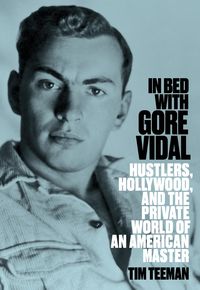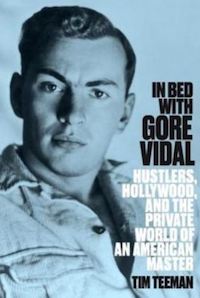 In Bed with Gore Vidal
In Bed with Gore Vidal
by Tim Teeman
Magnus Books. 283 pages, $19.99
THERE’S A REASON why Henry James burned his papers in the garden of Lamb House: when a famous writer dies, he’s vulnerable. People swoop in and write up his life, often in a way that Joyce Carol Oates would later call “pathobiography.”
In Bed with Gore Vidal has apparently upset some people who knew its subject, yet it’s people who knew Vidal who are the source for everything in Tim Teeman’s book, which means it amounts to an oral biography—like the one George Plimpton put together in 1997 on Truman Capote (Truman Capote: In Which Various Friends, Enemies, Acquaintances and Detractors Recall His Turbulent Career). But this one has a theme: Teeman argues that Vidal’s sex life is key to understanding his career, if only because The City and the Pillar, his 1948 novel about the gay underworld, effectively outed him. Yet Vidal always refused to call himself “gay.” For this lapse Teeman puts him, in a sense, on trial. Why did Vidal insist that there’s no such thing as homosexuals, but only homosexual acts, when clearly he had a longtime companion and copious sex with hustlers? Why did he not take part in the fight against AIDS?
Before we have finished the first chapter of Teeman’s book, we are replete with reasons. In an era that viewed homosexuality as a disease, Vidal’s political ambitions made such an admission impossible. (As he famously said: “I might have had a life in politics if it wasn’t for the faggot thing.”) Vidal felt that he had to defend himself against a homophobic world, not to mention the legacy of being brought up by a mean alcoholic mother who made him wary of any expression of love, which is why he insisted on paying people for sex, because that kept him safe from emotional involvement.
That, at least, is the gist of a book that Vidal may well have called, were he alive to review it, “Bioporn”—the term he used in an essay on a biography of Somerset Maugham. (Vidal predicted decades ago that eventually people would no longer read a writer’s novels, only books about writers, like In Bed with Gore Vidal.) But Teeman’s argument with Vidal seems sincere: it bothers a gay man of his generation that Vidal would not admit he was gay—or lead the fight against AIDS, as Larry Kramer urged him to, or do any of the things that the most prominent gay writer of his generation might have done. But Vidal refused to be so categorized, arguing, like Foucault, that categorization allows society to control and persecute. The idea of being called a gay writer appealed to him even less (why limit your audience?). But here’s the paradox: Vidal lived a very public life as a “same-sexer” (his term) who never passed up an opportunity to mock homophobia. The man who said repeatedly that the secret to his long relationship with a man he met at the Everard Baths, Howard Austen, was that they had never had sex (a claim Teeman’s sources cast doubt upon) never lost a chance to heap contempt on the disdain in which homosexuals were held. And he never let social mores get in the way of his own sex life. Vidal, a real moralist when it came to politics, could not bear moralizing about sex. A member of the ruling class, he says more than once in this book, is not bound by the conventions of the lower orders.
Teeman is too egalitarian or too young or too gay to put up with this without protest; and every now and then his impatience pokes through. (“Well,” he writes after Vidal’s prediction that healthcare reform would never happen under Obama, “Vidal seems to have been wrong about that.”) In the meantime, we get a feast of dish. However, oral biographies come with a problem: one must make up one’s own mind about the reliability of the person speaking. One of the speakers, for instance, is Vidal’s lifelong friend Scotty Bowers, the Hollywood go-between whose sometimes credulity-straining revelations in his own sex memoir, Full Service (2012), Vidal vouched for, and who remained a loving friend to the very end. In the other camp is Vidal’s half sister, Nina Straight, who took so dyspeptic a view of Vidal that she couldn’t even bear the voice of Howard Austen, an amateur singer whose recordings Vidal would listen to on CDs with tears in his eyes after Austen died: “The minute he started singing,” Straight says, you looked around “to see who had thrown the cat out of the window.”
Catty is what these witnesses are, and often very funny. Not only was Vidal an incredible wit (there are too many wonderful lines to pick one), but so were several of his friends. But everyone saw a different side of him. Indeed, as Teeman weaves the quotes together, each speaker seems to contradict the previous one. If one source says he was a man who “always wanted to be in control,” “as narcissistic a personality as you can imagine,” “incredibly vain,” the next one says how kind and generous and compassionate he was. Which Vidal one got depended on various things, I guess; sitting down with him at the table must have been a real crap shoot.
Plimpton’s book on Capote arranges his quotes by topic, but Teeman’s chapters—on Vidal’s childhood, the women in his life, his claim that he was bisexual, his adolescent love Jimmy Trimble, his partner Howard Austen, their years in Rome and Hollywood—also contain a running commentary by Teeman that begins with a gothic prologue in which our intrepid journalist enters the Hollywood Hills house where Vidal has just died, and ends with a grim portrait of Vidal’s final years.
Teeman’s real scoop is the latter. The strangest thing about Vidal’s final years, to those who followed him, was that, although we knew he was alive, that he’d returned to L.A. so that his partner (though Vidal would never use that word) could get medical care, Vidal was completely silent. He was not on TV, he was not writing essays or publishing novels. Instead, we learn here, he was so devastated by the loss of Austen that he became a complete drunk, which, along with diabetes, led to paranoia, dementia, and the alcoholic terminus called wet brain, which may explain his bequeathing his entire 37-million-dollar estate to Harvard University even though Vidal despised academics (“scholar-squirrels”) and felt insecure about never having gone to college. (He was a true autodidact, as anyone who’s read his essays can see.) But the people who devotedly cared for him got nothing. Was this dementia or sheer meanness? It’s hard to say. “I’m exactly as I appear,” Vidal said. “There is no warm, lovable person inside. Beneath my cold exterior, once you break the ice, you find cold water.” A few pages later a close friend confirms: “Gore was really cold: a really cold, cold fish.” Indeed, the only people who say nice things about Vidal in this book (besides Bowers) all happen to be straight women: Susan Sarandon, Claire Bloom, and Joanne Woodward.
The truth is there was no one in bed with Gore Vidal for the last years of his life except his cat; and after the cat died, he lasted only six months. In other words, though the bulk of this book is about his sex life, at the end there wasn’t any, as there isn’t for most old people, and so this erotic history devolves into a book about other aspects of Vidal: his relations with caretakers and friends, his concern for his place on the pecking order of celebrity-hood, his feelings about literary immortality. He was contradictory even on the latter. Shakespeare, he told a friend, would not have cared about the fact that his plays are still being performed; yet Vidal, says Jay Parini, “would say, ‘The great eraser has struck again,’ when something like a piece in The New York Review of Books about historical novels ran but didn’t mention his.” He even (after mistakenly swigging from a carafe of olive oil he thought was wine) blurted to an editor whose writers included both Vidal and Edmund White: “You want me to die so your writer Edmund White will be King Fag!”—a bizarre remark on several levels.
Even now, it’s hard to know whether Vidal’s refusal to be called gay was an intellectual conviction or shame over being homosexual—or simply anger that his country considered shameful something he felt no guilt about at all. But he was living in a time when the word “fag” was used without apology. Watch on YouTube the famous moment at the 1968 Democratic convention in Chicago when Vidal called William F. Buckley, Jr., a “crypto-Nazi,” and Buckley in return called Vidal a “queer” whom he wanted to punch in the face. Vidal’s arrogance is so oleaginous that one understands why Buckley wanted to deck him; though it’s hard to say which man seems like more of a queen—since both made a career of playing 18th-century aristocrats to a middle-class TV audience. But when Buckley’s upper lip draws back he looks exactly like a Doberman pinscher about to rip Vidal’s throat—a loss of control that only induces Vidal’s lips to curl into a smile at having successfully provoked the enemy. Of course, this led to a lawsuit. Vidal sued Truman Capote, as well, and was assaulted by Norman Mailer at a party. Writers were more pugnacious then—machismo was in the air—which explains to some degree Vidal’s career.
The last chapters of In Bed with Gore Vidal give the opposite impression, however; they’re more like King Lear in the Hollywood Hills. They bring to mind the last years of Somerset Maugham, or Norma Desmond in Sunset Boulevard. In the epilogue, Teeman even describes Vidal’s home in Ravello, Italy, after it’s been sold in a way that echoes the opening of Billy Wilder’s famous film: “The pool, once the site of parties and suppers, is now filled with dead fish with bruised purple backs hovering beneath the dark green surface.” All of this threatens to overwhelm everything we’ve learned about Vidal’s life in chapters like “La Dolce Vita,” which deals with the years Vidal and Austen lived so happily in Rome, when everything was going well and there were lots of hustlers, a period which is also the subject of Vidal’s marvelous essay on his friend Tennessee Williams, “Some Memories of the Glorious Bird and an Earlier Self.”
Vidal wrote two essays about Williams, and in the second—“Someone to Laugh at the Squares With”—he heaps contempt on biographers who “emphasize the horrors of the last years” of a writer “because the genre requires that they produce A Cautionary Tale.” Teeman’s book is based not only on conversations with Vidal’s caretakers; he uses everything from Christopher Isherwood’s diaries to talks with former editors and friends who knew him long before his dotage. But the last chapters of Teeman’s work are mesmerizing, since the conundrum of Vidal’s personality (the real subject of the book) is finally freed of the constraining prism of sex. Of course, one must always remember that the end of a man’s life is not what the life was about. In defending Williams’ reputation against Dotson Rader’s memoir (1985’s Tennessee, Cry of the Heart), in fact, Vidal closes his review with a moment on the beach in Key West when Williams turned to Vidal and said, “I like my life.” Vidal, like Williams, probably enjoyed his life too. Creative, successful, at the top of their game, both men were protean figures whose equivalents have so far not appeared.
Indeed, the grim final days, even as described by a writer whose eye for detail and ear for the vivid quote are as good as Teeman’s, only increase our sense of Vidal as sacred monster. Hugely ambitious, morbidly competitive (on Capote’s death: “Good career move”), determined to hector, and lecture, Vidal played a rare part in American life: the sourpuss, the fop (Clifton Webb in Otto Preminger’s Laura), the aristocratic contrarian who does not think this country is, pace Richard Nixon, the richest and greatest nation in the world. H. L. Mencken (a man Vidal admired) did something like this in the ’20s, and Henry Adams (likewise) before him—though Mencken was not glamorous, and Adams was so horrified by publicity that he published his novels under a pseudonym and his autobiography privately. But all three men liked pointing out the shortcomings of what Mencken called “the booboisie.” Adams and Vidal, moreover, spent a great deal of time abroad, Adams in Paris, Vidal in Italy, where his house high above the Amalfi coast was surely meant as a geographical expression of his alienation from his own country, if not a reprise of Tiberius on Capri, summoning young men to the palazzo. (Vidal, who hired hustlers galore in Rome, scrupulously avoided providing gossip to the inhabitants of Ravello.)
His residence in Italy also brought to mind Vidal’s identification with ancient Rome’s attitude toward sex, according to which, so long as you were the penetrator and not the penetrated, you retained your virility. All this may well have been as manufactured a persona as the one that the world-weary cynic Somerset Maugham created, an “armor” (the word friends most often used) put on to protect himself from a world which would have looked down on him had he been merely a “fag.” But there is no one who will play Petronius Arbiter to America’s Nero now. Vidal, who succeeded in so many forms—essay, novel, theater, movies, television—was a critic, not just of American homophobes, but of Americans in general. (“Does anyone care what Americans think? They’re the worst-educated people in the First World. They don’t have any thoughts, they have emotional responses, which good advertisers know how to provoke.”) This is when he wasn’t pointing out the whole world’s heterosexual problem: overpopulation.
Dennis Altman remarks here that Vidal outlived his golden age (the fifties and sixties); and it’s true that, toward the end, even admirers like Christopher Hitchens turned on him as a crank. After Austen’s death, he seemed to simply fall apart—ironic, many point out, for someone who had refused to admit that Austen was anything more than just a roommate. It was always Jimmy Trimble—the handsome baseball star who was the subject of The City and the Pillar, the school chum who died young at Iwo Jima—who Vidal said was the great love of his life; though Teeman suggests that may also have been a myth Vidal created. Still, it’s interesting to learn that Vidal is buried beside Howard Austen in Washington’s Rock Creek Cemetery, in a plot equidistant between the graves of Trimble and Henry Adams. It may be typical of Vidal’s ambition—or pretentiousness—to associate himself with a descendent of two presidents whose pedigree put Vidal’s in the shade, a historian who would have been horrified by Vidal’s passion to be on TV. But there are similarities. Both men found the politics of their time disgusting; both were critics of the American empire; and both lived long enough to find the mores they grew up with extinct in their old age.
In Teeman’s book, these mores are sexual. Gore Vidal, who refused to call himself gay, lived to see not only gay writers but also gay soldiers and gay marriage. In fact, he helped bring these changes about. Yet In Bed With Gore Vidal is a rich portrait of an American for whom same-sex desire was a problem he worked out so torturously as to remind one of another piece of antiquity: Laocoön and his sons writhing in the snakes. It would be easy to dismiss Teeman’s book as a guilty pleasure. But these interviews, especially those given in the heated aftermath of a man’s long decline and death—the hospital bed, you sense, has just been taken out of the bedroom—create a many-sided portrait that is fascinating. It’s a shame that so many typos, grammatical errors, and even missing words break the spell. Sometimes an anecdote contradicts the argument being made in the paragraph it’s supposed to support, frequently one doesn’t know to whom a pronoun refers, and at one point Teeman describes something as “uniquely singular.” But that can’t diminish the fact that this is a treasure trove of biographical information that is not just about sex.
Reading Teeman, and re-reading Vidal’s essays in the collection called United States (1995), is to be reminded not only of what a gift he had for the English language but also how pissed off he was. The only essays that are devoid of anger are the ones he wrote on writers and writing. In Bed with Gore Vidal is about a man who admitted he was a bully. But whether you admire the brilliant writer, or dismiss the “angry fag” (as a friend of mine called him), this book, this cousin to the funeral lunch in August, Osage County, is almost impossible to put down. How could it not be, when its subject once asked a visitor to his home in Ravello: “Do you know what the difference is between American boys and Italian boys? Italian boys have dirty feet and clean assholes, while American boys have clean feet and dirty assholes.” Or, who said to friends when they asked him to be godfather to their son, “Always a godfather, never a god”?
Andrew Holleran’s latest book is Chronicle of a Plague, Revisited: AIDS and Its Aftermath.






